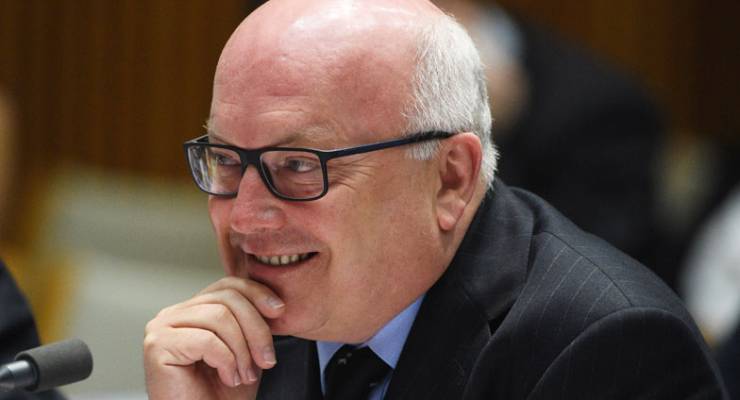
On the eve of an election campaign, Attorney-General George Brandis has hastily named three new human rights commissioners, but Human Rights Commission president Gillian Triggs warns there isn’t enough money for all three.
Brandis announced on Thursday that former Liberal senator and minister for health and ageing Dr Kay Patterson would replace Susan Ryan (a former Labor MP herself) as the Age Discrimination Commissioner. The generic human rights commissioner role — vacated by Tim “Freedom Boy” Wilson when he resigned to run as the Liberal candidate for the blue-ribbon seat of Goldstein — will be filled by Edward Santow, CEO of the Public Interest Advocacy Centre. Alastair McEwin, former CEO of People with Disability Australia, has been appointed as the Disability Commissioner.
On making the announcement in Senate estimates yesterday, Brandis said Wilson had been “enormously successful” in his advocacy for freedom during a “particularly distinguished term” where he “reshaped” the discussion about human rights in Australia:
“I hope he brings to this Parliament, as I’m sure he will, the same enthusiasm and eminence as an advocate for human rights that he brought to the position.”
Santow, Brandis says, had spent many years working with the homeless and community legal services, and was also an associate of former royal commissioner Dyson Heydon.
Brandis said the three were chosen by a panel of people including the secretary of the Attorney-General’s Department Chris Moraitis, the president of the Australian Law Reform Commission Rosalind Croucher, someone from the Australian Public Service Commissioner, a former director-general of the Queensland Department of Justice and Triggs.
But Triggs warned the decision to appoint three commissioners could potentially reduce the effectiveness of the commission. The Human Rights Commission is already facing $5 million in budget cuts and a 2.5% efficiency dividend on top of the cuts. Without extra funding, the commission would be out another $700,000 for the third commissioner role.
“It is certain jobs would be lost if we don’t get funding for a third commissioner position,” Triggs said in Senate estimates.
“When you have a budget of $15 million, and a reduction of $1 million, you’re obviously looking at a reduction in capacity to meet its obligations.”
Triggs said she hoped that the commission could have discussions with Brandis about extra funding and said the commission had entered into preliminary informal discussions with the department about funding, but the commission would not be able to support the work of its commissioners without more funding:
“It means we have fewer and fewer staff to support what becomes in a effect a top-heavy commission with seven commissioners and a president. We simply don’t have the ability to service the needs of each of those commissioners if we are not funded to do so.”
Labor has proposed keeping the positions of disability commissioner and age discrimination commissioner separate and full time, and would incorporate Santow’s role as a part-time job for the president of the commission, but under the Human Rights Act, the party will be unable to sack Santow if Labor forms government.
Shadow attorney-general Mark Dreyfus has not yet indicated whether an elected Labor government would give the Human Rights Commission more funding, but he called on Brandis to allocate the extra funding for the third commissioner announced today:
“He cannot pretend to be a friend of the commission by returning a full complement of commissioners while at the same time delivering a backdoor $700,000 cut.”
All positions are held for five years.








“Brandis said Wilson had been “enormously successful” in his advocacy for freedom during a “particularly distinguished term” where he “reshaped” the discussion about human rights in Australia”.
What the ?? Really you could not make this stuff up.
Well, Wilson definitely reshaped the discussion about Human Rights commissioners in Australia – most of us marvelled that anyone thought his role worth $400K annually.
you would need a crowbar to get Wilson off the public teat.. what a homosexual finds gratifying about hanging around a bunch of homophobes is the mystery..